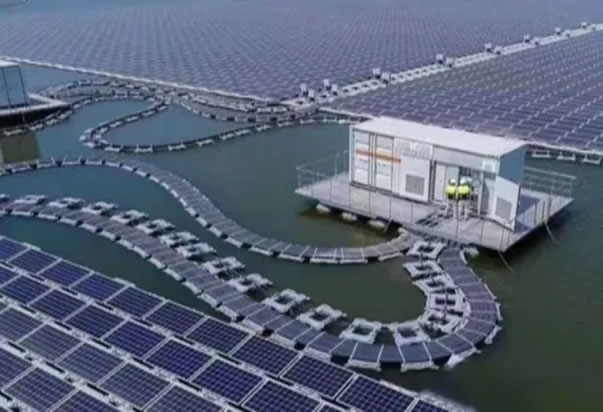Floating Solar PV Projects

Ten highlights:
- Save land resources and have less impact on the aquatic environment. The photovoltaic power generation project on the water has no support foundation and cable trench excavation, and there is no road construction on the site, which greatly reduces ground excavation and is beneficial to soil and water conservation.
- High power generation efficiency. The surface of the water is relatively open, which can effectively avoid the restriction of shadows on the efficiency of photovoltaic modules. The solar irradiation area is uniform and the illumination time is long. Water has a cooling effect on the solar panel, which can suppress the rise of the surface temperature of the module. According to relevant calculations, if the temperature of the panel is reduced by 1 ° C, the output power can be increased by 0.5%, and the power generation can be 10% ~ 15 higher than those of the ground or rooftop power station in the same area, which can reduce the losses of power generation compared to ground and rooftop solar panels at high temperatures in summer.
- Coverage of the components can reduce water surface evaporation and save water resources.
- Solar photovoltaic panels block a part of the sunlight from reaching the water surface, reducing photosynthesis, which can inhibit the reproduction of algae to a certain extent.
- Cost advantage. The floating solar PV power plant is integrated, which facilitates the installation and operation of the solar tracking system, and reduces the huge cost caused by the ground photovoltaic power station because of the need to install a dual-axis tracking system for each panel. If the floating body platform is made of bamboo raft with special waterproof treatment, it can also save costs and achieve high environmental protection benefits.
- Easy component cleaning. The selected materials for photovoltaic power generation on the water must meet the highest waterproof requirements. Compared with ground photovoltaics, the power generation efficiency of the module is less damaged during cleaning.
- Avoid land restrictions. In some countries or regions with limited land resources and difficult land development, the development of floating solar PV projects is a good choice, opening a new path for the application of photovoltaic power generation.
- Duty-free water surface. The “National Land Classification (Trial)” implemented on January 1, 2002 stipulates that land in the country is divided into three categories, namely “agricultural land”, “construction land” and “unused land” . In accordance with the “Provisional Regulations for Farmland Occupation Tax of the People’s Republic of China”, taxation provisions are made for “agricultural land” and “construction land”, without involving the taxation imposed on “unused land”. The cost of the duty-free water surface is much lower than that of the taxed ground (land cost accounts for about 3% of ground photovoltaic power plants)
- Compatible with aquaculture. The construction of a floating photovoltaic power station on a reservoir with aquaculture or fish pond can also create a better hatching environment for fish and increase aquatic production.
- Tourism benefits. It can be used as a unique scenic spot, and it can serve as an embellishment of water landscape, bringing the benefits of viewing and tourism.In summary, as a new model, the floating PV power station will continue to progress with the research and development, so as to promote the further development of the new energy market.

